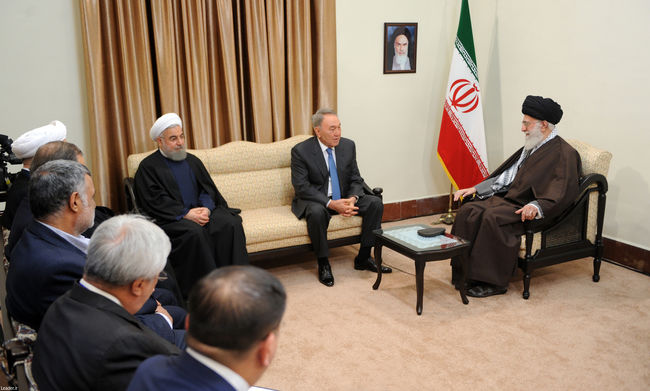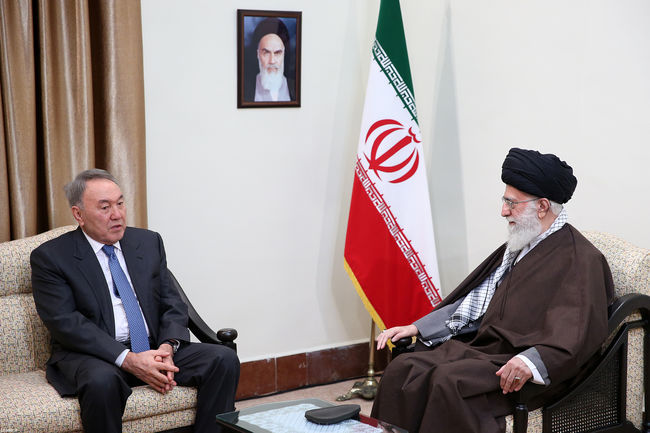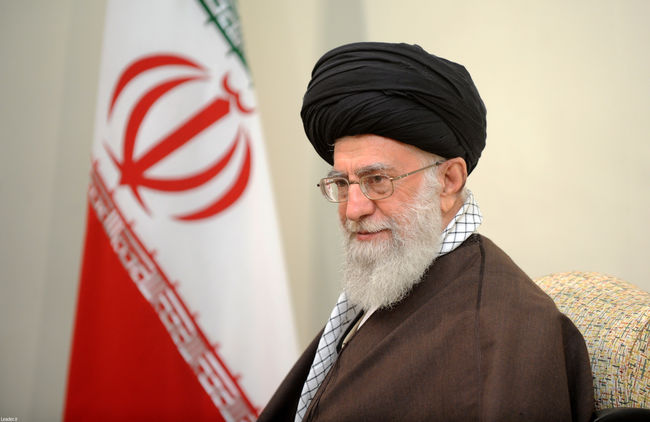Ayatollah Seyyed Ali Khamenei, Leader of the Islamic Revolution, in a meeting with Mr. Nursultan Nazarbayev, president of Kazakhstan, on Monday, highlighted the necessity of boosting cooperation between the two countries in different political, economic and international fields and the fight on terrorism, saying: “Certain powers, particularly America, are not honest and serious in their alleged fight against terrorism, but Muslim countries can save the Muslim world from this threat through honest cooperation.”
The Leader pointed out the United States’ help for Daesh terrorist militants operating in Iraq as an example of dishonest measures taken by various coalitions claiming to be fighting terrorism, saying: “In a bid to justify their double-standard treatment [of terrorism], they classify terrorism into good and bad categories.”
The Leader of the Islamic Revolution highlighted the European nationality of the perpetrators of terrorist incidents in Europe and the massive presence of people from these countries in the ranks of terrorist groups operating in Syria and Iraq, adding: “These realities prove the lack of seriousness on the part of the West, particularly Americans, in the fight on terrorism.”
Ayatollah Khamenei described today’s world as a tumultuous one, adding: “Today, Muslim countries are on the one hand facing the threat of terrorist groups that are acting in the name of Islam and, in fact, against Islam and Muslims, while on the other hand, certain Western powers are not willing to see Muslim countries united and standing by one another.”
Ayatollah Khamenei said tackling the threat of terrorism and the double-standard policies of world powers requires enhanced cooperation among Muslim countries within the framework of wise and logical policies, adding: “We have brotherly feelings toward Muslim countries, and Iran and Kazakhstan share views on many global issues.”
The Leader of the Islamic Revolution referred to cooperation between Kazakhstan and Iran in international bodies, stressing: “Despite ‘common religion, history and culture’ and ‘abundant potentialities of the two countries’, trade and economic relations stand at a low level and we welcome enhancement of cooperation in different political, economic, trade, and transportation sectors as well as cooperation on the issue of [determining] the legal regime of the shared maritime zone [in the Caspian Sea].”
During this meeting, which was attended by Iranian President Hassan Rouhani, Mr. Nursultan Nazarbayev, president of Kazakhstan, described Iran as a big, powerful, reliable and dependable neighbor, saying: “The two countries enjoy abundant potentialities for the development of relations and during this trip we reached agreement on important economic and trade plans, which would help enhance and increase [bilateral] cooperation.”
The Kazakh president described terrorism as a serious threat and while referring to terrorist incidents in the West and the Western governments’ effort to introduce Islam as the symbol of terrorism, said: “Terrorism and the flood of migration of refugees, in fact, stem from the Western governments’ actions against legal governments in regional countries, because when a stable central government is unseated in a country, terrorism will take its place.”
Referring to the Islamic Republic of Iran’s might and the spiritual influence of the Leader of the Islamic Revolution in Muslim states, Mr. Nazarbayev said: “I totally agree with Your Excellency’s views about unity in the Muslim world and we must show to the entire world that Islam is the religion of progress, unity and fight against terrorism.”



